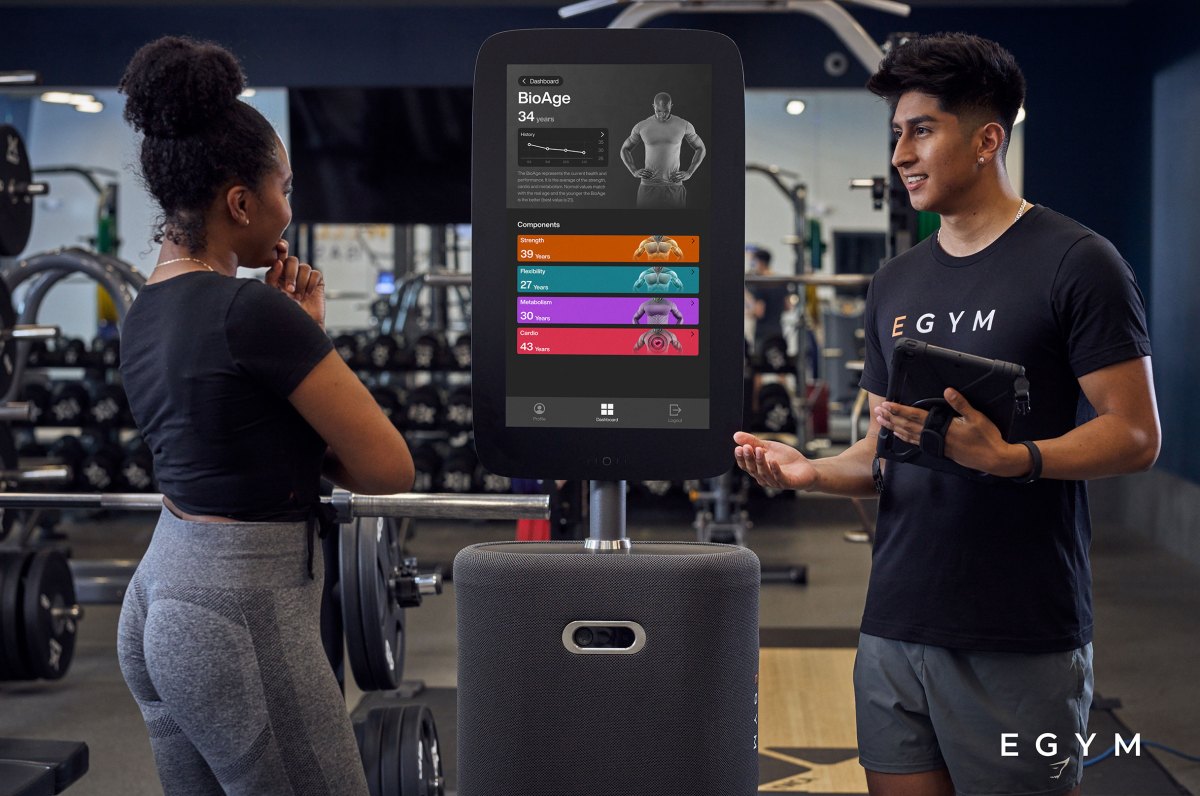Getting healthy is big business these days. Now a startup that’s come up with a unique approach leveraging tech to help people with their exercise regimes is announcing a big round of funding, putting some weight behind its own push for growth.
Munich-based EGYM — a maker of connected fitness equipment and personalized training tech that has also built out a fitness marketplace between gyms and corporate wellness programs — has closed a Series G round of just over $200 million from L Catterton and Meritech, both new backers of the startup.
The funding is coming in at a post-money valuation of more than $1.2 billion, CEO and founder Philipp Roesch-Schlanderer confirmed to TechCrunch in an interview, and it will be used in a couple of key areas. The company wants to drive more business in its newest markets, the U.K. and the U.S., where it has respectively acquired two smaller companies, Hussle and FitReserve. It also wants to continue building out an AI-based assistant, called Genius, that it launched earlier this year. Despite the hype around AI, Genius is no AI gimmick, Roesch-Schlanderer said.
“I don’t really have an opinion about the broader AI world, but what I can tell you is, in our field, it adds huge value to making sure that people have always the best possible workout at their fingertips based on past success, their behaviors, their goals.” Only around 10% of gym goers have access to personal trainers, making the AI trainer a practical alternative, he added.
Roesch-Schlanderer founded EGYM after his own frustrations with gyms and working out.
Nearly 200 million people around the world stay in shape by working out at gyms. Roesch-Schlanderer also wanted to get in shape, but he found himself at an impasse. If you don’t already go to the gym and work out regularly, chances are you don’t quite know where to begin. And even people who do go regularly don’t have a lot of data about what they could be doing better or differently to avoid getting hurt.
With those gaps in mind, EGYM built a series of connected workout stations that help track what users are doing, leaning on apps to help them track their activity both on EGYM equipment and, using data from wearables, wherever they happen to be breaking a sweat. Initially, EGYM contracted with gyms to sell the equipment, and then later with companies building out company wellness plans to get their employees using that equipment. The whole model is based around B2B2C: No direct-to-consumer plans are in the works.
The formula has been a big success. Roesch-Schlanderer said the company is profitable on an EBITDA basis, and expects to generate $500 million in revenues in 2025.
The company today says that its corporate network operation, Wellpass, has 17,000 sports partners (that is, gyms), 14,000 corporate customers, and 3 million “eligible” employees. (As a point of comparison, when EGYM last raised funding — $225 million in July 2023 — it had 2.5 million users on Wellpass.) Overall, some 18,000 fitness and health centers use EGYM machines and services, working out to some 6 million people using EGYM’s products monthly. Now around 75% of the business is subscription-based, and the remaining 25% is focused around its equipment, he said. “The corporate subscription market is bigger than gym tech but the gym tech is what creates the value,” said Roesch-Schlanderer.
Roesch-Schlanderer is tapping into a rising trend. The world is slowly coming around to the idea of preventative healthcare, looking at better ways of identifying what might go wrong and what to do to avoid that, before it gets too late and your options have dwindled down to cocktails of medication, operations, and a lot of expensive doctor visits.
Companies like Neko Health — the startup co-founded by Daniel Ek — are building clinics that scan customers’ bodies and combines that with AI algorithms to provide a wide range of diagnostics about the state of users’ health so consumers get a better grip on the state of their health. Others are exploring what role the microbiome might play in our health regimes. Fitness is shaping up to be a core part of that proposition.
Nevertheless, the size of the investment is notable given that we are still seeing a dearth of growth rounds in Europe, particularly for companies that are not focused on AI.
The AI play at EGYM, launched earlier this year, is still new and in progress. Asked about which models it uses, the company told me, “EGYM Genius is based on a set of machine learning models that are tailored to the specific problems of the ‘workout’ domain. So Genius is not based on any of the big large language models, but rather on a set of models that has been specifically tailored and trained based on the many years of workout data that EGYM has collected. This allows us to combine the power of deep learning models with advantages of other machine learning methods that e.g. provide more explainability than LLMs.”
Roesch-Schlanderer said that he was proactively getting approached for another round as soon as the previous one was announced.
“We had enough cash to survive another COVID,” he told TechCrunch. COVID-19, and being able to survive something like it, figures big in his mind, because the company nearly collapsed during the pandemic.
However, given that he was getting a lot of inbound interest, he decided to use the moment to find what he described as “dream investors.” Taking a leaf from the Jeff Bezos school of fundraising, he said, “I decided to assemble the right investors for my mission.” That mission: to double down on growth, with an appetite for a little risk thrown in by way of its AI play.
Paul Madera, co-founder and partner at Meritech, and Marc Magliacano, a managing partner at L Catterton, are both joining the board with this round.

